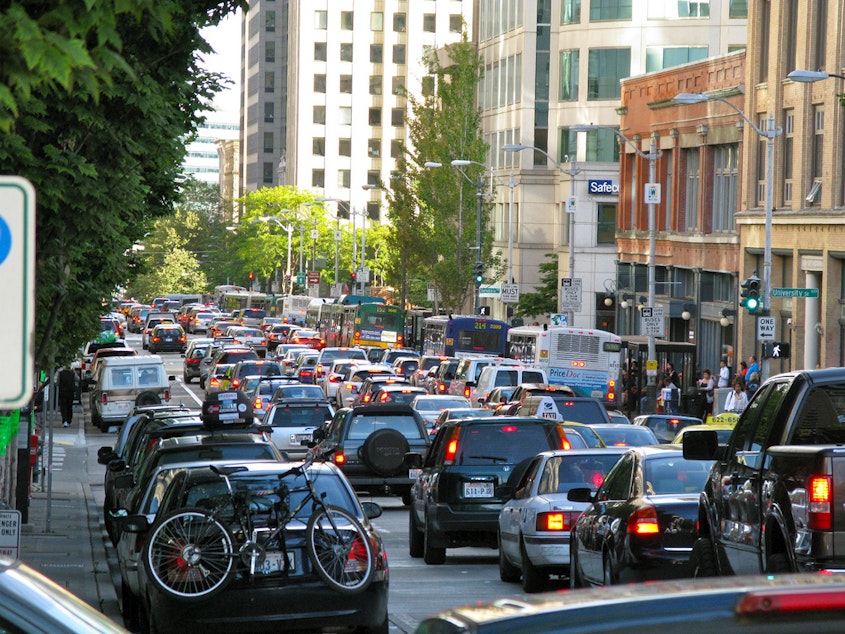Driving in downtown Seattle? You may soon have to pay a toll

Seattle Mayor Jenny Durkan has unveiled a dozen initiatives aimed at tackling the city's persistent carbon problem. Congestion pricing, also known as tolls, tops the list.
Any tolling system on cars entering downtown would help fund expanded transit service and more electric-vehicle charging stations in underserved neighborhoods, according to the mayor's office.
The measures are intended to help Seattle turn a corner on its spotty record on greenhouse gas emissions.
Seattle officials have long claimed to be national leaders on climate change by slashing the city's carbon dioxide emissions, even as the growing city's emissions have stubbornly hovered around 6 million tons a year.
"We know that we can reduce our greenhouse gases significantly," Durkan said.
Sponsored
The biggest culprit is transportation, mostly cars.
"We have around 400,000 vehicles entering our center city on a daily basis. We need to reduce that amount," Durkan said. "You have to also commit to having that infrastructure that allows people to get out of their cars."
The mayor's proposal for congestion pricing had few specifics. The Seattle Department of Transportation is expected to finish a study of various tolling options by the end of the year.
Think global, toll local
Sponsored
Our rapidly changing global climate is, of course, a global problem. Even so, Durkan said local governments have a big role to play.
"In the time of Trump, if local governments, particularly cities, don't lead, we as a country won't meet our climate goals," she said.
On Monday, Environmental Protection Agency administrator Scott Pruitt announced that the Trump administration would roll back the nation's fuel economy standards for automobiles. The move would likely do more to accelerate U.S. carbon dioxide emissions than any of the other climate-harming actions the administration has taken.
Climate policies Durkan announced Wednesday also include:
- Requiring electric vehicle chargers at all new or renovated parking facilities
- Transitioning all taxi and ride-share services to electric vehicles, by a year to be determined by a public process
- Letting developers build 20 taller or larger buildings in exchange for steps to make them carbon neutral
- Switching 18,000 Seattle homes from oil to electric heat
- Requiring all city departments to assess climate impacts of their projects
Sponsored
Since 2011, Seattle policy has been to cut climate-harming emissions citywide by more than half (58 percent) by 2030 on the way to eliminating them entirely 20 years later.
"We need to do as much as we can as fast as we can," Vlad Gutman-Britten with the environmental group Climate Solutions said. "These are some great steps."
For whom the tolls
Tolls, some with variable pricing aimed at deterring drivers from getting behind the wheel at the busiest times of day, are not uncommon on United States highways. But no American city has cordoned off its downtown with tolls the way some cities in Europe and Asia have.
Between deterring drivers and providing funding for less-polluting forms of travel, congestion pricing alone can knock 10 percent off all carbon emissions in the city, more than any other single policy in the works, according to the city's sustainability office.
Sponsored
"Congestion pricing can’t stand alone as a tool to change behavior," Durkan said. "You have to offer real alternatives to people so they will choose something other than their car."
"It's deeply inequitable," Mariya Frost with the conservative Washington Policy Center said. "This is another move by Seattle officials to punish working families that depend on cars for mobility."
Frost said her group supports tolls if they're used to build more highway lanes.
Officials with the Association of Washington Business declined to comment until the city comes up with a specific tolling proposal.
Durkan said disadvantaged populations suffer the most from climate change and that the policies announced would lead to a healthier and more just city.
Sponsored
European cities including London, Oslo and Stockholm have used congestion pricing to reduce traffic in their downtowns for more than a decade.
The daily fee to drive in the center of London on weekdays between 7:00 a.m. and 6:00 p.m. is currently about $16. Depending on the time of day, the toll in Stockholm is up to $12.50 a day.
"It works perfectly fine if you have a dense area with too much traffic and there's no fear people will stop coming to it," Mark Hallenbeck with the Washington State Transportation Center at the University of Washington said.
"People hate paying the charge, but they live with it," Hallenbeck said of London drivers.
A review by the U.S. Department of Transportation found that London's tolls helped boost bus service 40 percent. Reduced traffic volumes also sped up traffic in clogged central London by 30 percent.
If Seattle does put congestion pricing in place for its crowded central core, it could be a first for this continent.
In March, New York state legislators declined to adopt a similar plan for cars entering Manhattan.
Officials in Vancouver, British Columbia, are expected to release a report by the end of April recommending some sort of congestion pricing scheme for that city's central business district and bridges.
Seattle's latest climate action plan:
John Ryan loves getting tips and documents. He can be reached at jryan@kuow.org or on the encrypted Signal or WhatsApp apps at 1-401-405-1206 (whistleblowers, never do so from a work or government device, account or location). For greatest security, use KUOW's SecureDrop portal. Snail mail is also a safe way to reach him confidentially: KUOW, 4518 University Way NE #310, Seattle, WA 98105. Don't put your return address on the outside.

